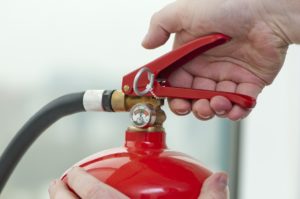
Did you recently discharge your fire extinguisher to extinguish a minor fire in your home or business?
Did you recently discharge your fire extinguisher to extinguish a minor fire in your home or business? Once the fire is completely out, it’s vital to know how to clean up fire extinguisher residue so you may inspect the actual damage and mitigate health risks. So, check out this guide to cleaning up various types of fire extinguisher residue.
Dry Chemical Extinguisher Residue
Dry chemical fire extinguishers use sodium bicarbonate, potassium bicarbonate, and monoammonium phosphate to fight fires. In addition, these agents leave a corrosive residue on surfaces, and it’s essential to clean up the powder very quickly. So, follow these steps when cleaning up dry chemical fire extinguisher residue:
- Sweep loose residue and spray the leftovers with isopropyl alcohol diluted with warm water. Also, allow the solution to sit for several minutes, and then wipe with a damp rag.
- To neutralize residue from potassium bicarbonate and sodium bicarbonate-based, apply a 98% hot water solution and 2% vinegar. Rinse with water after leaving the solution for several minutes.
- Clean the surface with soapy water and rinse. After rinsing, blow-dry the whole area to eliminate excess water and allow it to finish air-drying completely.
Class K Wet Chemical Extinguisher Residue
Most often, wet chemical fire extinguishers are utilized for grease and oil fires that happen in commercial kitchens. They use a salt compound that develops a crust over the flames, removing the oxygen supply and minimizing the temperatures. If you recently had to put out a kitchen fire, practice these steps to clean up the mess:
- Shut off all cooking equipment in the area.
- Use a cloth soaked in hot and soapy water to eliminate foamy residue from all surfaces.
- Rinse with clean water and dry it thoroughly before turning on the equipment.
Polish Agent Fire Extinguishers
Clean agent fire extinguishers are non-conductive as well as non-ozone depleting, making them perfect for extinguishing fires near electronics that could be damaged by corrosive dry chemicals or water. In addition, they are effective against Class A to C fires.
Lastly, these extinguishers are ideal for removing fires in areas with sensitive items, like library books, delicate artwork, or electronic equipment. Also, the firefighting agents evaporate into the atmosphere, leaving no residue behind. After all, they don’t require clean-up after discharge.
Commercial and Residential Fire Prevention from Judd Fire Protection
If you want to ensure your home and business are safe throughout the year, trust Judd Fire Protection, LLC. We have over two decades of experience designing, installing, inspecting, and repairing residential and commercial fire protection systems. We serve clients throughout Maryland, Pennsylvania, Washington, D.C., Virginia, and West Virginia. If you are interested in finding out more about our services and protecting your home and business, give us a call at 410-871-3480.
